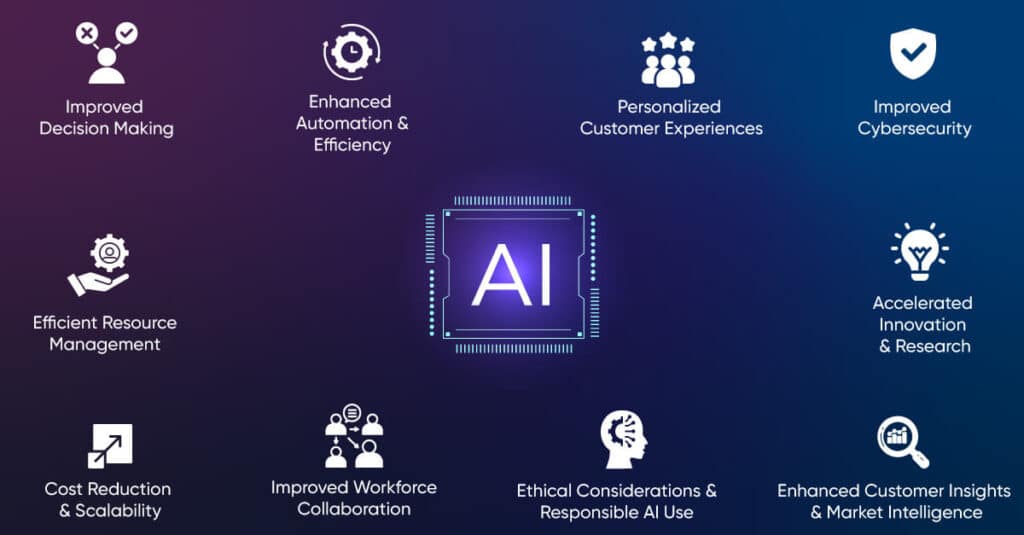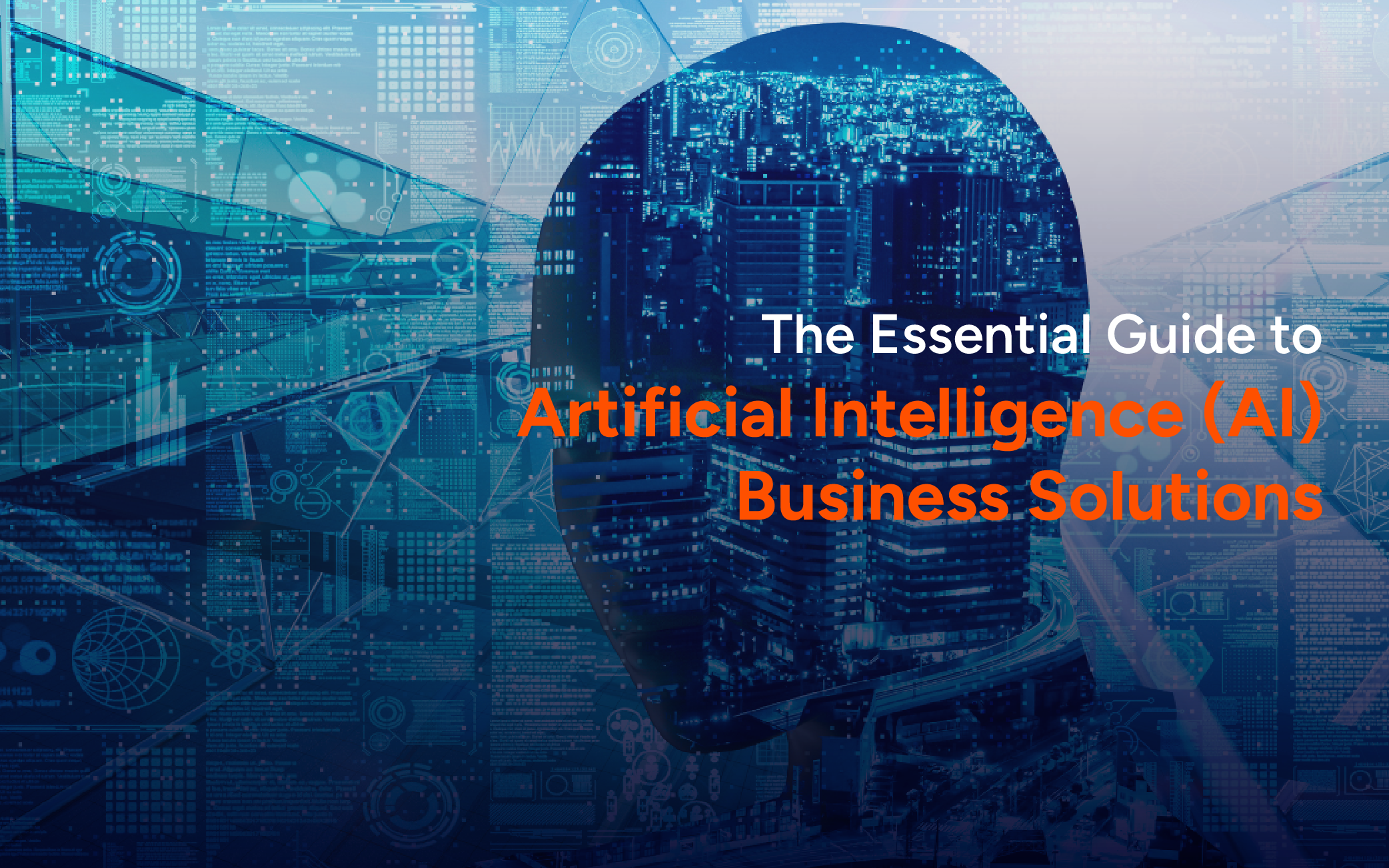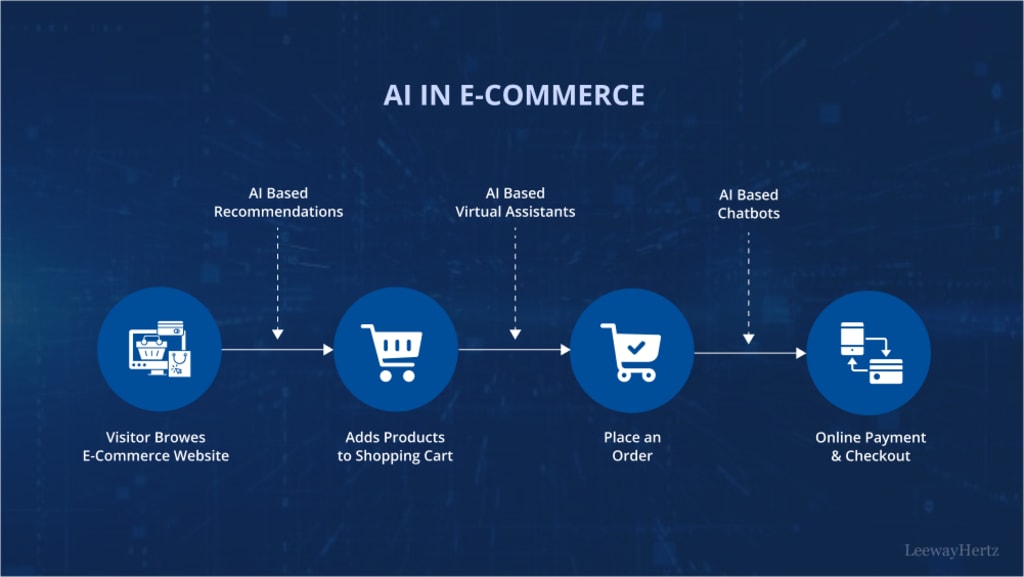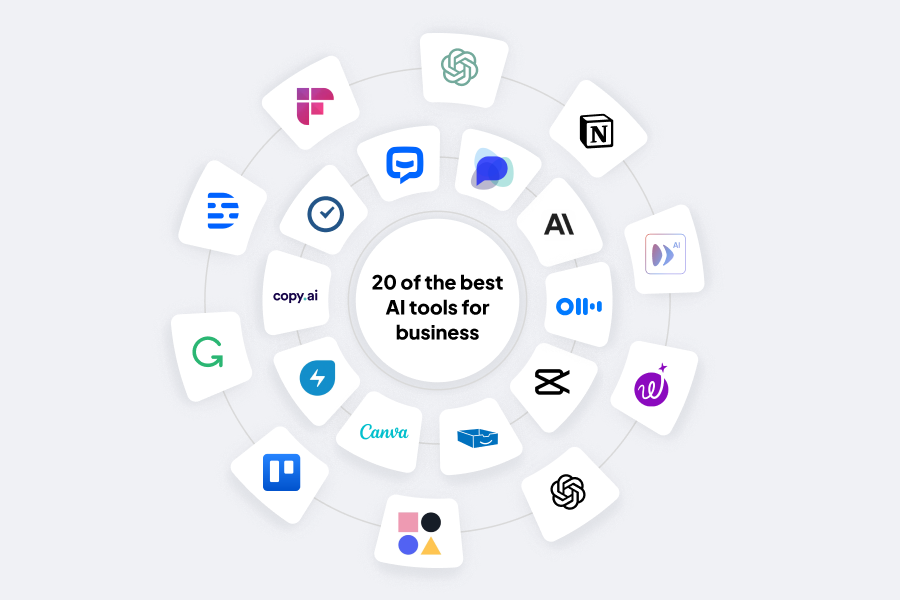Impact of AI in business: A Real Look at a Changing Future
By Admin

Impact of AI in business is undeniable. Discover how artificial intelligence is reshaping industries, empowering entrepreneurs, and creating new opportunities for earning money from home. Learn about AI's future, its benefits, and real-world examples.
The impact of AI in business is no longer a futuristic concept; it's a present-day reality rapidly transforming how companies operate, innovate, and connect with customers. For entrepreneurs and individuals looking to earn money from home, understanding this shift is crucial. Artificial intelligence, with its ability to process vast amounts of data, automate tasks, and provide intelligent insights, is ushering in an era of unprecedented efficiency and opportunity. In this comprehensive guide, you will learn what is AI, how does it work, explore the profound ways how AI is changing the business world, discover the numerous how AI benefits business, and delve into practical examples of AI in the real world. We'll also examine the role of AI in small businesses, highlight the best uses of AI in business, and discuss cutting-edge AI business solutions that are shaping tomorrow.
What is AI and How Does It Work?
At its core, what is AI how does it work refers to the simulation of human intelligence in machines programmed to think like humans and mimic their actions. This encompasses various fields, including machine learning (where systems learn from data without explicit programming), natural language processing (enabling computers to understand human language), and computer vision (allowing machines to "see" and interpret images).
AI systems typically work by ingesting massive datasets. Through algorithms, they identify patterns, make predictions, and even learn from their own experiences, continually improving their performance. This ability to learn and adapt is what makes AI so powerful and transformative for businesses across all sectors.
How AI is Changing the Business World
The landscape of commerce is being profoundly reshaped by artificial intelligence. How AI is changing the business world can be seen in numerous aspects, from enhancing operational efficiency to revolutionizing customer interactions. This technological shift is driving innovation and creating entirely new business models.
One of the most significant changes is the automation of repetitive tasks. AI-powered tools can handle everything from data entry and customer service inquiries to supply chain management and financial reporting. This frees up human employees to focus on more strategic and creative endeavors, leading to increased productivity and job satisfaction. The streamlining of workflows is a major benefit for businesses of all sizes.
Furthermore, AI is transforming decision-making processes. With its ability to analyze vast quantities of data at lightning speed, AI provides businesses with insights that were previously unattainable. This data-driven approach allows for more informed and strategic decisions, leading to better outcomes and a competitive edge.

How AI Benefits Business
The advantages of integrating AI into business operations are multifaceted and far-reaching. Understanding how AI benefits business is key to leveraging its full potential.
- Enhanced Efficiency and Productivity: AI automates routine tasks, leading to faster completion times and reduced operational costs. This boosts overall productivity and allows resources to be reallocated more effectively.
- Improved Customer Experience: AI-powered chatbots and virtual assistants provide instant customer support, answer queries, and even personalize recommendations, leading to higher customer satisfaction and loyalty.
- Data-Driven Insights: AI analytics tools can process and interpret large datasets, providing valuable insights into market trends, customer behavior, and operational performance. This enables smarter, more strategic business decisions.
- Cost Reduction: By automating tasks, optimizing processes, and predicting potential issues, AI helps businesses reduce operational expenses and minimize waste.
- Personalization at Scale: AI allows businesses to deliver highly personalized experiences to individual customers, from product recommendations to tailored marketing messages, fostering stronger relationships.
- Innovation and New Opportunities: AI opens doors to new products, services, and business models that were previously unimaginable, fostering a culture of innovation.
Examples of AI in the Real World
To truly grasp the impact of AI in business, it's helpful to look at concrete examples of AI in the real world that are already making a difference.
- Netflix's Recommendation Engine: This is a prime example of AI and machine learning in business. Netflix uses AI to analyze viewing habits and recommend movies and TV shows, significantly enhancing user experience and retention.
- Healthcare Diagnostics: AI is used in medical imaging to detect diseases like cancer with greater accuracy and speed, assisting doctors in making quicker diagnoses.
- Fraud Detection in Banking: Financial institutions employ AI to identify suspicious transactions and prevent fraud, protecting both banks and their customers.
- Self-Driving Cars: While still evolving, autonomous vehicles powered by AI are a clear indicator of how AI is transforming transportation and logistics.
- Smart Home Devices: Virtual assistants like Amazon Alexa and Google Assistant use AI to understand voice commands and control smart home devices, simplifying daily life.

AI in Business Analytics
The role of AI in business analytics is becoming increasingly critical for companies aiming to gain a competitive edge. Traditional business intelligence tools often rely on historical data, but AI takes this a step further by enabling predictive and prescriptive analytics.
AI-powered analytics platforms can process vast amounts of structured and unstructured data, identifying hidden patterns, correlations, and anomalies that human analysts might miss. This leads to more accurate forecasts, optimized resource allocation, and a deeper understanding of market dynamics. For example, AI can predict customer churn, identify optimal pricing strategies, or even forecast supply chain disruptions before they occur. This predictive capability is invaluable for proactive decision-making.
Best Uses of AI in Business
Identifying the best uses of AI in business depends on a company's specific needs and industry, but some applications offer universal benefits.
- Customer Service Automation: AI-powered chatbots and virtual assistants can handle a large volume of customer inquiries, providing instant support 24/7. This improves response times and frees up human agents for more complex issues.
- Personalized Marketing: AI algorithms can segment customer data, identify preferences, and deliver highly targeted marketing campaigns, leading to higher conversion rates and improved ROI.
- Supply Chain Optimization: AI can predict demand fluctuations, optimize inventory levels, and streamline logistics, leading to reduced costs and improved efficiency in the supply chain.
- Fraud Detection and Cybersecurity: AI systems can analyze vast amounts of data to detect anomalies and potential threats in real-time, bolstering security measures and preventing financial losses.
- Predictive Maintenance: In manufacturing and other industries, AI can predict when machinery needs maintenance, preventing costly breakdowns and minimizing downtime.
- Talent Acquisition and HR: AI can assist in screening resumes, identifying suitable candidates, and even predicting employee performance, streamlining the hiring process.

AI Business Solutions
A wide array of AI business solutions are available today, catering to diverse industry needs and business sizes. These solutions range from off-the-shelf software to custom-built AI models.
For example, many companies now utilize CRM (Customer Relationship Management) platforms with integrated AI to enhance customer interactions and personalize sales efforts. ERP (Enterprise Resource Planning) systems are also incorporating AI to optimize operations across various departments, from finance to manufacturing.
Furthermore, specialized AI solutions are emerging for specific industries, such as AI in healthcare for diagnostics, AI in finance for algorithmic trading, and AI in retail for inventory management. The continuous development of AI business solutions means that companies of all sizes can find ways to leverage this technology to their advantage.

How is AI Changing E-commerce?
The impact of AI in business is particularly evident in the e-commerce sector. How is AI changing e-commerce in fundamental ways, from personalized shopping experiences to optimized logistics?
- Personalized Product Recommendations: AI analyzes Browse history, past purchases, and even real-time behavior to offer highly relevant product suggestions, leading to increased sales and customer satisfaction.
- Enhanced Search and Discovery: AI-powered search functions understand natural language and user intent, making it easier for customers to find what they're looking for, even with vague queries.
- Chatbots and Virtual Assistants: These AI tools provide instant customer support, answer FAQs, guide shoppers through the buying process, and even handle returns, improving the overall customer experience.
- Dynamic Pricing: AI algorithms can adjust product prices in real-time based on demand, competitor pricing, and inventory levels, maximizing revenue and competitiveness.
- Fraud Detection: AI helps e-commerce platforms identify and prevent fraudulent transactions, protecting both businesses and consumers.
- Inventory Management and Logistics: AI optimizes inventory levels, predicts demand, and streamlines shipping and delivery processes, reducing costs and improving efficiency.

AI in Small Businesses
It's a common misconception that AI is only for large corporations. In reality, AI in small businesses offers immense potential for growth and efficiency. Small businesses can leverage AI to level the playing field against larger competitors.
- Automated Marketing: Small businesses can use AI tools to automate email marketing campaigns, social media posting, and targeted advertising, reaching more customers with less effort.
- Customer Relationship Management (CRM): AI-powered CRMs help small businesses manage customer interactions, track sales leads, and provide personalized support, fostering stronger customer relationships.
- Financial Management: AI tools can assist with bookkeeping, expense tracking, and even financial forecasting, helping small businesses maintain healthy finances.
- Competitive Analysis: AI can analyze market trends and competitor activities, providing small businesses with insights to inform their strategies and identify new opportunities.
- Virtual Assistants: Even a simple AI-powered virtual assistant can help a small business owner manage their schedule, respond to emails, and handle administrative tasks, freeing up valuable time.

Best AI Tool for Business
Choosing the best AI tool for business depends heavily on your specific needs and budget. However, several categories of AI tools are proving to be invaluable across various business functions.
- Customer Relationship Management (CRM) with AI: Platforms like Salesforce Einstein embed AI to enhance sales, service, and marketing automation.
- Marketing Automation Platforms with AI: Tools like HubSpot and Marketo use AI to personalize content, optimize campaigns, and provide deeper insights into customer behavior.
- Business Intelligence (BI) Tools with AI: Tableau, Power BI, and Qlik Sense leverage AI for advanced data analysis, visualization, and predictive modeling.
- Natural Language Processing (NLP) Tools: Platforms like Google Cloud AI and IBM Watson offer APIs for text analysis, sentiment analysis, and chatbot development.
- Generative AI Platforms: Tools like OpenAI's ChatGPT and DALL-E are transforming content creation, from generating marketing copy to designing visuals. These are examples of generative AI in business operations.
- Cloud AI Services: Amazon Web Services (AWS AI), Google Cloud AI, and Microsoft Azure AI offer a wide range of pre-built AI services and machine learning tools, making AI accessible to businesses without extensive in-house expertise.
Generative AI in Business Operations
Generative AI in business operations represents a significant leap forward in how businesses can create content, design products, and even simulate complex scenarios. Unlike traditional AI that analyzes existing data, generative AI can produce new, original content.
For instance, generative AI can create marketing copy for websites and ads, design new product prototypes, generate realistic images and videos, and even write code. This has profound implications for creative industries, marketing departments, and product development teams, allowing for rapid iteration and personalized content creation at scale. From generating personalized email campaigns to designing unique graphic elements, generative AI is streamlining creative workflows and fostering innovation.
AI and Machine Learning in Business
The terms AI and machine learning in business are often used interchangeably, but it's important to understand their relationship. Machine learning is a subset of AI that focuses on enabling systems to learn from data without being explicitly programmed. This learning process is what drives many of the transformative impact of AI in business.
Machine learning algorithms analyze historical data to identify patterns and make predictions or decisions. For example, a machine learning model might be trained on past sales data to predict future demand or on customer support interactions to identify common issues. The continuous feedback loop in machine learning allows systems to improve their accuracy over time, making them increasingly valuable assets for businesses seeking to optimize operations, enhance customer experiences, and drive innovation.
Future of AI in Business
The future of AI in business is dynamic and promising, with continuous advancements poised to further revolutionize industries. We can expect to see even more sophisticated AI models, deeper integration of AI into everyday business tools, and new applications emerging in areas like personalized medicine, advanced materials, and sustainable energy.
The ethical implications of AI, including data privacy, bias, and job displacement, will also be a major focus. Businesses will need to navigate these challenges responsibly to ensure that AI is used for the greater good. The focus will shift towards human-AI collaboration, where AI augments human capabilities rather than replacing them entirely, leading to a more efficient and innovative workforce.
FAQ Section
Q1: What is the primary impact of AI in business today? A1: The primary impact of AI in business today is enhanced efficiency through automation, improved decision-making via data analytics, and personalized customer experiences, leading to significant competitive advantages.
Q2: How can small businesses leverage AI to grow? A2: Small businesses can leverage AI through automated marketing, AI-powered CRM systems, financial management tools, and virtual assistants to streamline operations and better engage with customers.
Q3: What are some real-world examples of AI benefiting businesses? A3: Real-world examples include Netflix's recommendation engine, AI for fraud detection in banking, personalized e-commerce experiences, and AI-driven predictive maintenance in manufacturing.
Q4: How does generative AI differ from other AI applications in business? A4: Generative AI in business operations creates new, original content like marketing copy or designs, unlike other AI applications that primarily analyze existing data or automate tasks.
Q5: Is AI going to replace human jobs in the business world? A5: While AI will automate many routine tasks, the future of AI in business is more likely to involve human-AI collaboration, augmenting human capabilities and creating new job roles focused on AI management and innovation.
Q6: What is the role of machine learning in the impact of AI in business? A6: Machine learning in business is a core component of AI, enabling systems to learn from data and improve performance over time, driving predictive analytics, personalization, and automation.
Q7: How is AI transforming customer service in businesses? A7: AI transforms customer service by providing instant support through chatbots, personalizing interactions, and analyzing customer feedback to improve service quality and satisfaction.
Q8: What are the biggest challenges businesses face when adopting AI? A8: Challenges include data quality issues, the need for specialized skills, ethical considerations like bias and privacy, and integrating AI seamlessly into existing business processes.








